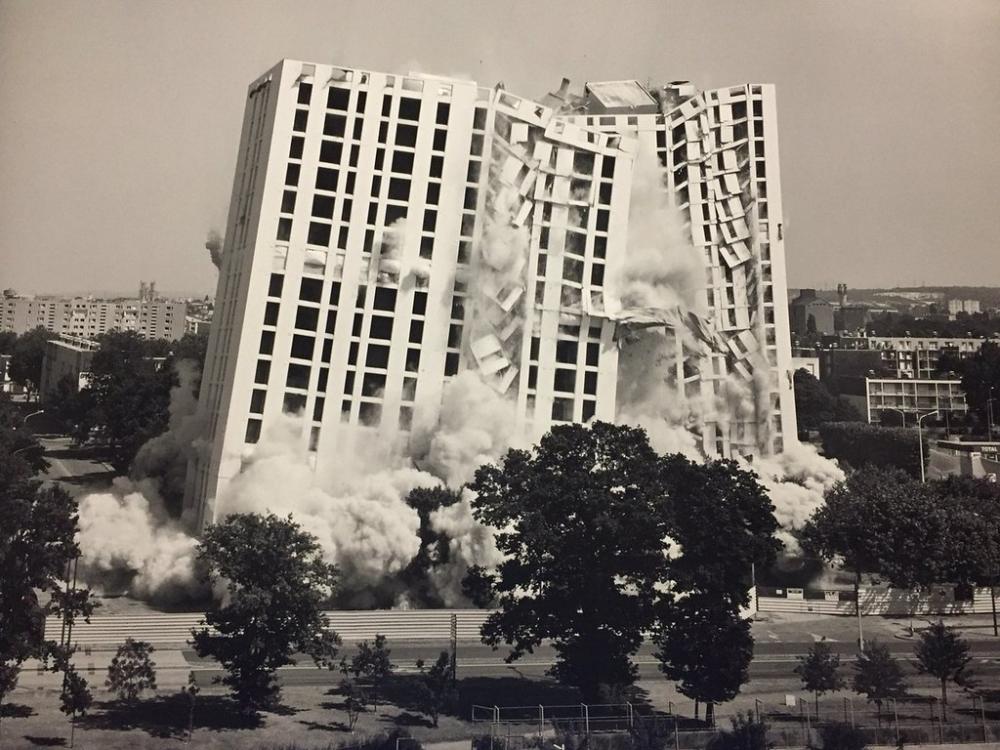Who owns the city? On the "financialisation" of urban housing
Just like a tree planted by the water, I shall not be moved
– Mavis Staples
Sinds de financiële crisis in 2008 is huisvesting geen vanzelfsprekend basisrecht meer, maar een aantrekkelijk investeringsobject of financieel product waar (groot)kapitaal een veilig onderkomen in vindt. Beursgenoteerde vastgoedondernemingen, hedgefondsen, private-equityfirma’s en vastgoedbeleggingsfondsen investeren steeds vaker in de (huur)woningmarkt door bijvoorbeeld hele woonblokken op te kopen. In hun honger naar meer ‘profit’, lobbyen deze investeerders voor deregulering en drijven zij de huur- en koopprijzen omhoog, of laten deze huizen doelbewust verkrotten om deze vervolgens te slopen en er (vaak dure) woontorens voor in de plaats te bouwen. Gaandeweg worden vaak de meest precaire bevolkingsgroepen en ‘have-nots’ uit de markt geprijsd, weggedrukt uit de stad waar zij soms generaties wonen en wortel hebben geschoten.
Ook voor Brussel is dit een gekend scenario. Van wie is de stad werkelijk? Hebben bewoners nog iets te zeggen over hun buurt? Hoeveel controle heeft de lokale politiek nog over de stad? En begrijpen we wel genoeg wat er echt aan de hand is?
In dit programma gaan we samen met Leilani Farha, Fredrik Gertten en Alice Romainville onder de stenen op zoek naar de grondoorzaken van deze stedelijke problematieken en veranderingsprocessen. De scenografie is verzorgd door Lietje Bauwens en Wouter de Raeve.
Op het programma:
- Een interview met Leilani Farha (voormalig VN rapporteur voor het recht op huisvesting & hoofdfiguur in documentaire PUSH) – live vanuit Canada – over hoe de tendensen die zij waarnam tijdens de opnames van PUSH zich sindsdien verder ontwikkeld hebben en over haar nieuwste project, The Shift (www.make-the-shift.org). Gemodereerd door Quinsy Gario.
- Een panelgesprek met o.a. de PUSH-regisseur Fredrik Gertten en Alice Romainville (Brussels Studies Institute/ULB, gespecialiseerd in de Brusselse woonmarkt). Op de eerste rij nodigen we organisaties, activisten en bewoners uit die aan de frontlinies van deze problematiek het gesprek kunnen verrijken met hun onmisbare perspectief.
- Een eerste rij, met vertegenwoordigers van organisaties als FairFin, Rassemblement Bruxellois pour le Droit à l' Habitat, Coordination des Sans-Papiers en European Action Coalition, zal het gesprek verrijken met hun standpunten.
- Een spoken word performance
• Quinsy Gario is a performance poet and artist from Curaçao and St. Maarten. His work centers on decolonial remembering and unsettling institutional and interpersonal normalizations of colonial practices. Gario's most well-known work is Zwarte Piet Is Racisme (2011–2012). As a member of the collective Family Connection established in 2005 by Glenda Martinus and Gala Martinus, respectively his mother and aunt, his current research is about attempting to institute otherwise.
• Leilani Farha is the former UN Special Rapporteur on the Right to Housing and Global Director of The Shift. Her work is animated by the principle that housing is a social good, not a commodity. Leilani has helped develop global human rights standards on the right to housing, including through her topical reports on homelessness, the financialization of housing, informal settlements, rights-based housing strategies, and the first UN Guidelines for the implementation of the right to housing. She is the central character in the documentary PUSH regarding the financialization of housing, screening around the world. Leilani Launched The Shift in 2017 with the UN Office of the High Commissioner for Human Rights and United Cities and Local Government.
• Frederik Gertten is a director and journalist based in Malmö, Sweden, and owner and manager of the production company WG Film which he founded in 1994. Previously he worked as a foreign correspondent and columnist for radio, TV and press in Africa, Latin America, Asia and around Europe. Today he combines filmmaking with a role as a creative producer at WG Film. Recent films include PUSH (2019), BIG BOYS GONE BANANAS!* (2012) and BIKES VS CARS (2015).
• Alice Romainville is a researcher at the Laboratory of Human Geography at the ULB. Her doctoral thesis, defended in 2015, is entitled La production capitaliste des logements à Bruxelles.
• 431 initiates multidisciplinary frameworks for the creation, curation, and research of forms of knowledge production and presentation such as spatial interventions, text, performance and film. Each project puts forward its own specific methodology. 431 is initiated by Lietje Bauwens and Wouter De Raeve. Bauwens (1990) studied philosophy, writes for different cultural platforms, and was artist in residence at the Van Eyck academy 2018–19. De Raeve (1982) studied landscape architecture and visual arts and produced several lecture series, publications and installations.
collaboration of Cosmopolis, Brussels Academy, Community Land Trust Brussels, Brussels Centre of Urban Studies & Kaaitheater.
Voor dit debat heb je een festivalbandje nodig. → koop je bandje
Voor dit programma heb je een Covid Safe Ticket nodig. Hier vind je meer info. Lees ook het Kaaitheater statement: Wie heeft toegang tot theater?
